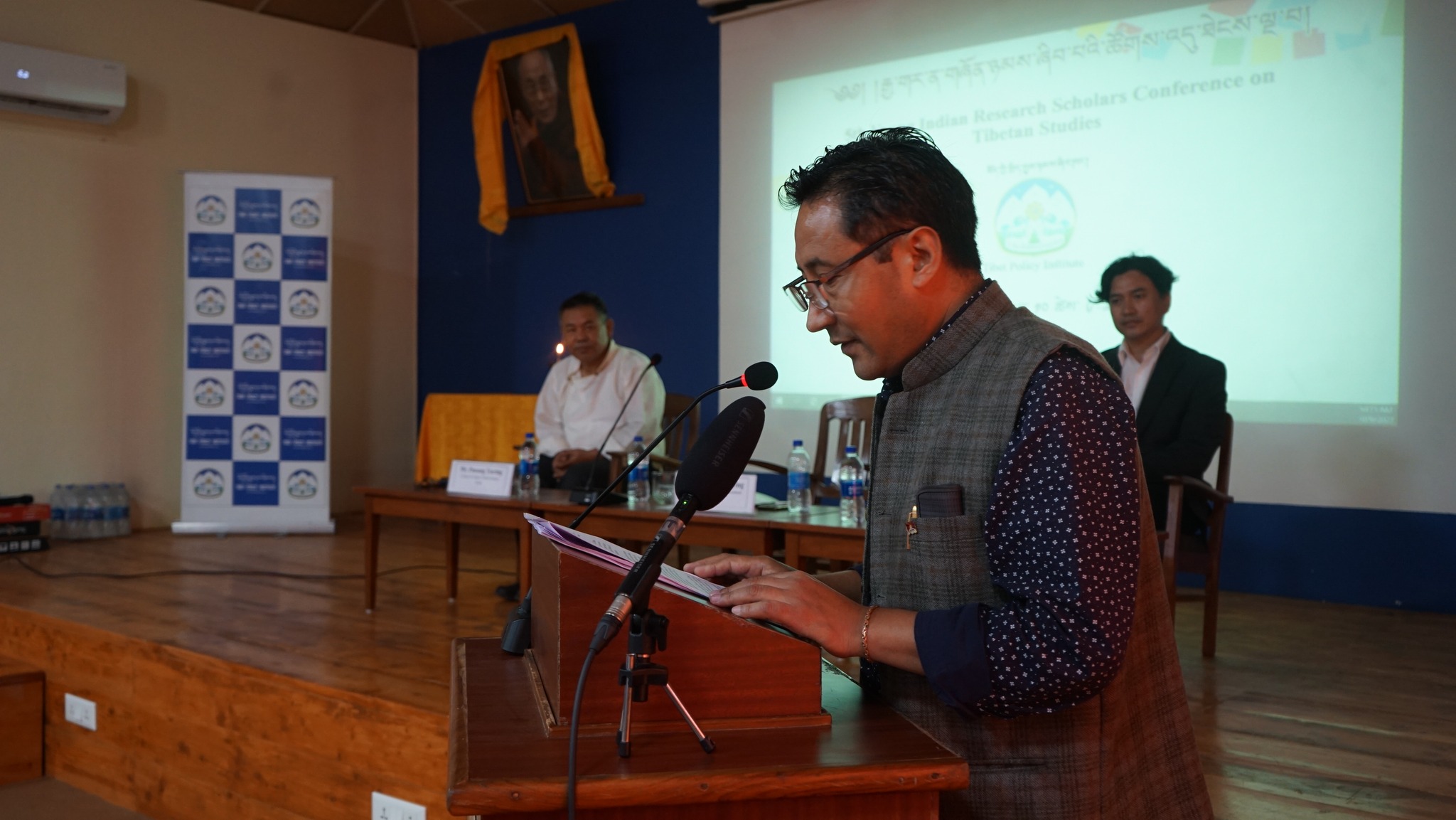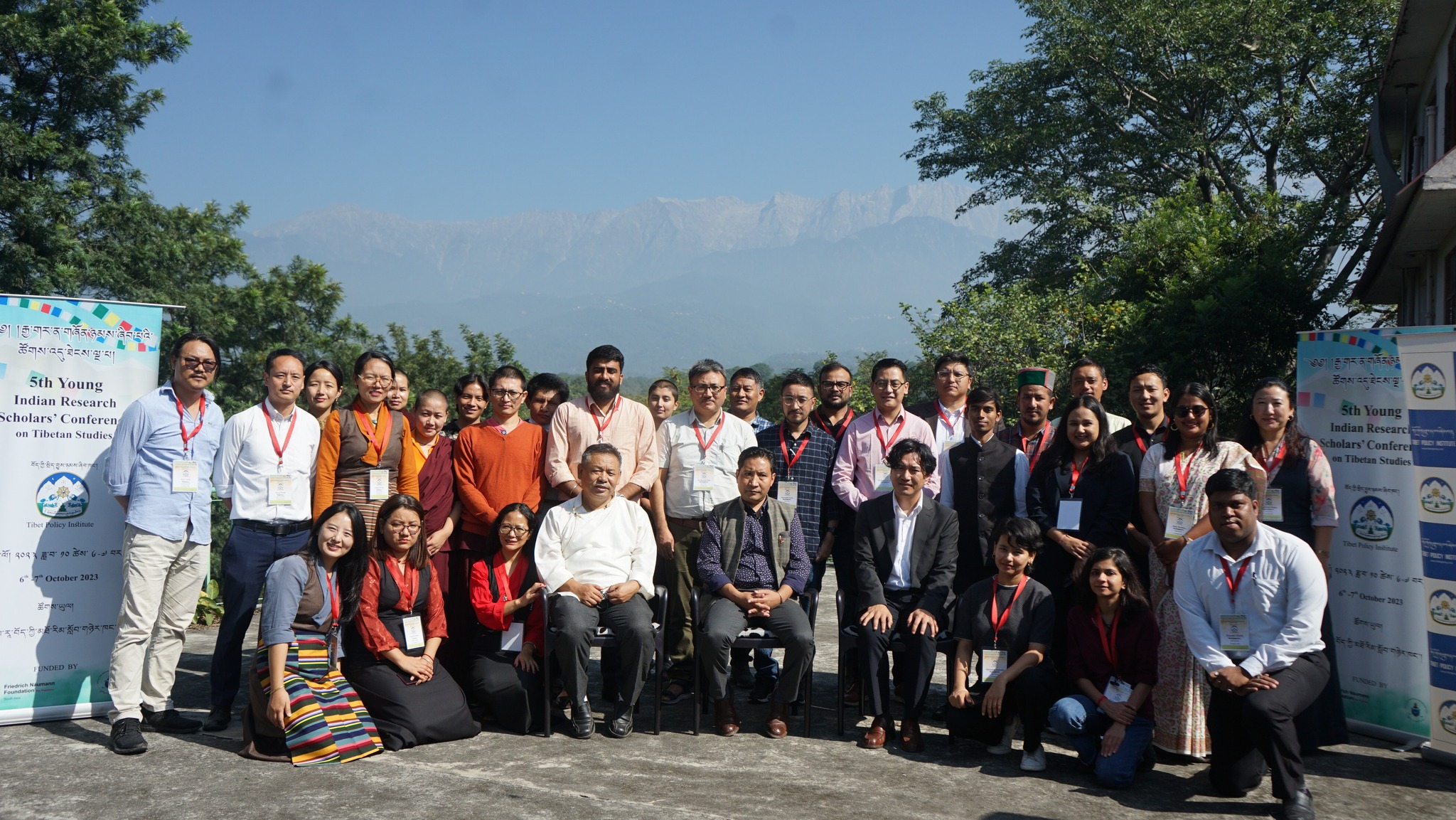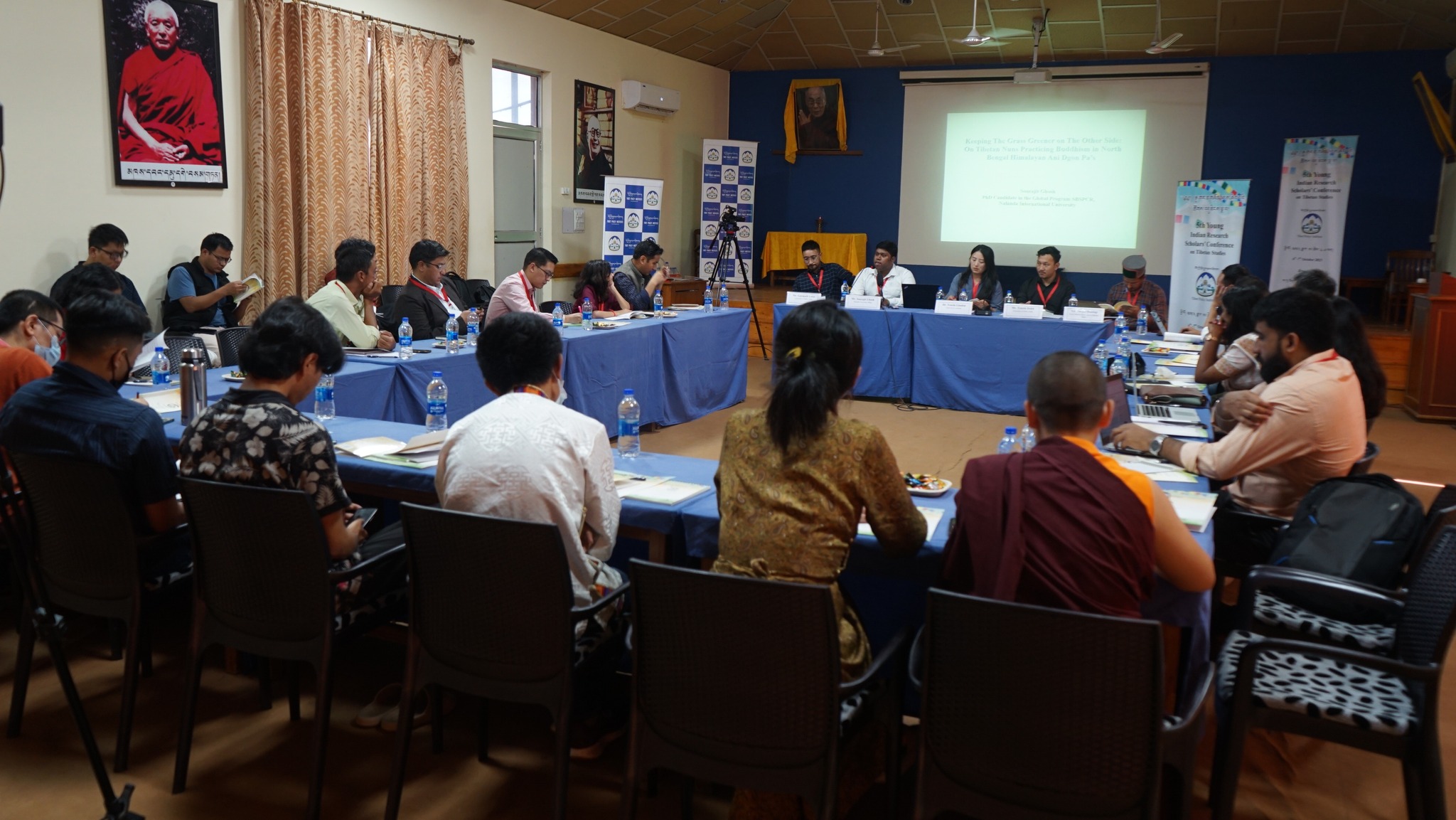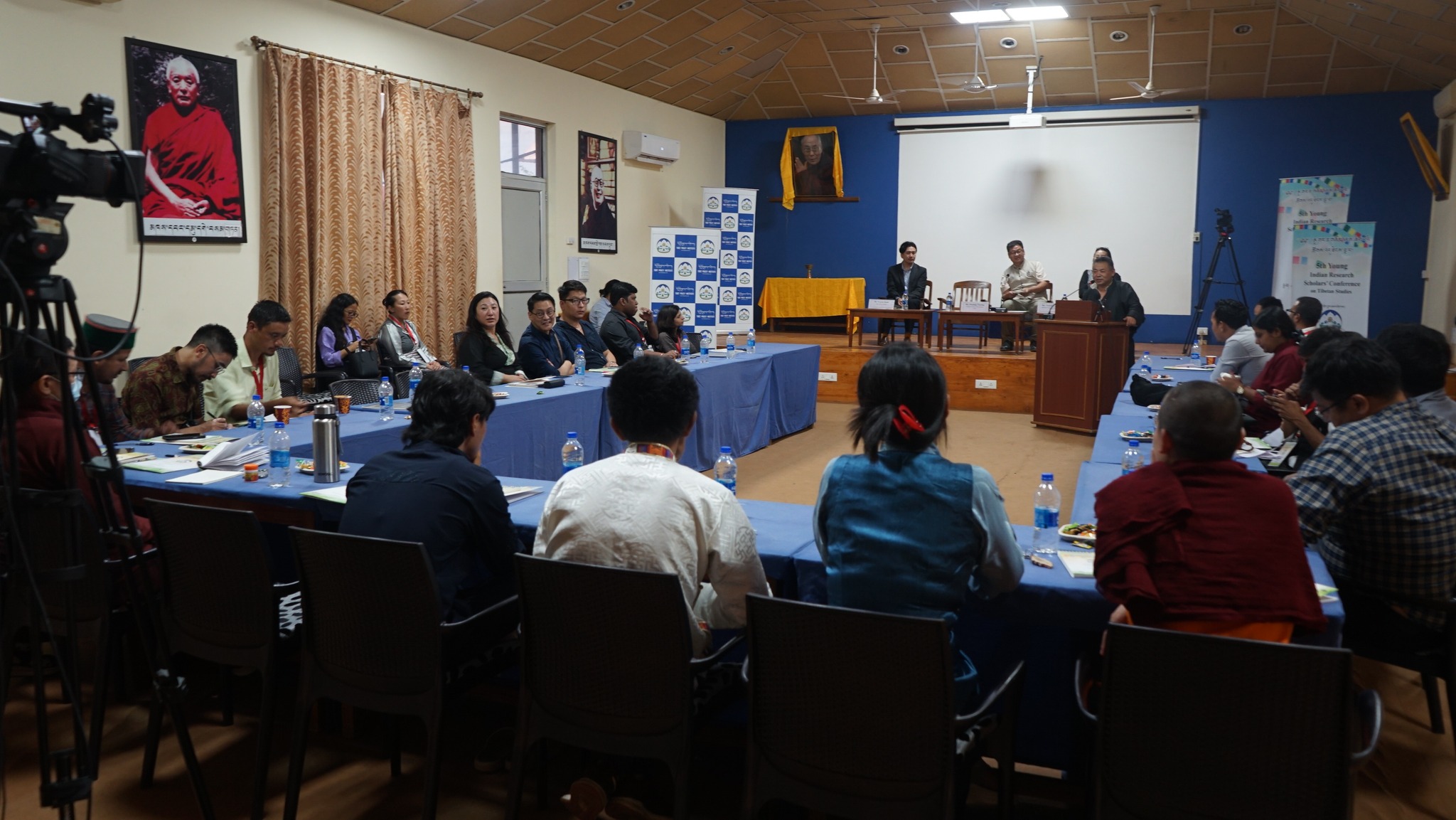The romanticized representation of the relationship between Tibet and the Himalayas has often belied the political and strategic importance of the region, which later became the focal point of a dispute between global powers, particularly between India and China in the latter half of the 20th Century. Postcolonial scholars in South Asia have increasingly perceived and defined the Sion-Indo-Tibet conflict in terms of security and geopolitical strategy, and the focus shifted away from the political, trade, religious, and cultural nature of the historical relationship between communities in the region. Therefore, the Tibet Policy Institute (TPI) organized a two-day Conference exploring the relations between Tibet and the Himalayas under the title,5th Young Indian Research Scholar’s Conference on Tibetan Studies. It was a conglomeration of researchers and scholars from all walks of life working on Tibet and the Himalayas. The conference invited 20 different Indian scholars, mostly from the Himalayan region to present their research. The 5th Young Indian Research Scholar’s Conference on Tibetan Studies was held at the College for Higher Tibetan Studies, Sarah, Dharamshala.
The Chief Guest, Mr. Karma Choeying, Secretary of the Department of Information and International Relations (DIIR) inaugurated the event by lighting a butter lamp in front of His Holiness the Dalai Lama’s portrait. Following the inauguration, the keynote address was given by Mr. Karma Choeying, the Chief Guest. He pointed out at the very beginning that it was not only because there are sizable Tibetans living in India but rather the age-old cultural ties between Tibet and India with Tibetans under His Holiness the Dalai Lama who have kept the Nalanda traditions alive. He continued to highlight the importance of culture, geopolitics, environment of Tibet and the increasing geopolitics and geo-strategic importance of Tibet and Himalaya in India-China relations.
The event formally began with the welcome address delivered by Dr. Tenzin Desal, Senior Fellow of the Tibet Policy Institute, who began by dwelling into a critical inquiry on how we define ‘time’ and specifically in relation to དུས་ལོག་པ་ ‘Collapse of Time’ during Tibet’s National Uprising and the subsequent exile of His Holiness the Dalai Lama and the Tibetans. He further explained that the age we are living in, the age of the anthropocene is throwing up numerous challenges. He stressed that researchers from the field of Himalayan and Tibetan studies should deal with these questions and can address these challenges more efficiently. This was followed by a group photo including the participants, organizers and the chief guest.
The conference consists of three panels and two professional panels. Panel one under the theme Tibet, Tibetan Buddhism and Narratives chaired by Dr. Tenzin Lhadon of Tibet Policy Institute has four speakers, Mr. Sourajit Ghosh from Nalanda University, Mr. Gurmath Lotos from the University of Delhi, Mr. Tenzin Delek from the University of Delhi and Mr. Dorjee Dondup from Nava Nalanda Maha vihara Nalanda.Mr. Ghosh’s presentation was titled, Keeping the Grass Greener on the Other Side: Tibetan Nuns Practicing Buddhism in North Bengal Himalayan Ani dgon pa-s. He takes a deeper look into the aspirations and limitations of Tibetan nuns with limited facilities and access to higher Tibetan spiritual authorities. He brought forth ideas like a global sisterhood in the case of Buddhist female monastic traditions and explained how they supported each other’s path in dharma. Mr. Gurmath Lotos’s presentation was titled, Demystifying Tibet’s Question: Identity, Nation-hood, and Politics. He discussed the apparent misrepresentation of Tibet in Western imagination and pointed out problems in fanticization, and romanticization of a utopian place called Tibet. He underscores the need to reimagine and reconstruct what Tibet is inorder to demystify the place and reclaim the homeland of Tibetans. The third speaker, Tenzin Delek’s presentation was on Emotional Geographies of Home: A Study of Exile Tibetan Youth in Ladakh in which he discussed the concept of emotional geography and its relevance to the idea of home for the exiled Tibetan youth in Ladakh. Mr. Dorjee Dondup spoke on Re-identification Yeshi Gonpo Temple in Nalanda: A Study with Special Reference to the Biography of Chak Lotsawa.
The professional panel one under the theme, Tibet and the Himalayas chaired by Dr. Tenzin Desal of Tibet Policy Institute has three speakers, Dr. Jigme Yeshe Lama from the University of Calcutta, Dr. Junjun Sharma Pathak from Rashtriya Raksha University and Mr. StanzinLhaskyab from Jawaharlal Nehru University. Dr. Jigme Yeshe Lama’s presentation was titled, (Un)Freedom, Modernity, and Tibet in which he spoke of the relationship between Tibet and China through the lens of modernity as it indulges in a conversation between modernity and (un)freedom through the case study of Tibet under postcolonial China. Dr. Junjun Sharma Pathak’s presentation was on The Himalayan Frontier and India-China Territorial Dispute in the Eastern Sector: Diverse Indian Narratives from Arunachal Pradesh. She spoke of the dynamics of border conflict and security along the disputed McMohan Line in Arunachal Pradesh, how the people in the region responded to the Chinese claim, and the ways in which the region transformed post-1962 India-China war. Mr. StanzinLhaskyab’s presentation was titled, Emergence of Buddhism as Soft Power in Asia: Implication on Himalayan Buddhist Region. He spoke of the growing implications of Buddhist diplomacy in the Himalayan region, which are center of contestation of rising Asian powers like India and China.
Day two of the panel two under the theme, Migration, Ecology, and State chaired by Dr. Tenzin Lhadon of the Tibet Policy Institute has three speakers who are Dr. Alok Yadav from Hindu College, Uttar Pradesh, Dr. Devendra Kumar from Shiv Nadar University and Mr. Deepak Kumar Gautam from Jawaharlal Nehru University. Dr. Alok Yadav could not make it to the conference but he sent us a video of his presentation on Securing Sovereignty; Understanding the Ramification of State-Building and Militarization in Tibet. Dr. Devendra Kumar’s presentation was titled, Mining in Tibet: Environmental, Political and Economic Aspects. In his presentation, he explored the environmental impact, labor rights issues, its impact on the dis-empowerment of the Tibetan population and their access to resources, and as part of state-building in border regions. Mr. Deepak Kumar Gautam’s presentation was on Migration, Boundaries, and Tibetan Settlement: An Analysis of India-China Relations in the 21st Century. He spoke on the issues of Tibetan migration, the boundary issue between India and China, and Tibetan settlement in Arunachal Pradesh.
The Professional Panel Two under the theme, Borders, Climate Change and Identity chaired by Dr. Tsewang Dorjee of the Tibet Policy Institute has three speakers. Dr. Sangmu Thendup from Sikkim Universityspoke on Environmental Perspectives in Early Buddhism. She could not attend the conference due to adverse weather conditions in Sikkim. She spoke of the early Buddhist attitude towards animals and the natural environment and the reasons behind such attitudes. Dr. Uden Bhutia from Government General Degree College made her presentation titled, Buddhist Monks and Technology: Understanding a Traditional Religious Group in a Digitalized World. She could not attend the conference but sent us a video of her presentation. Dr. Lobsang Yangtso from International Tibet Network made a presentation titled, Impact of Climate Change on Nomads in Lo Manthang, Upper Mustang: A Field Report. She spoke of the impact of climate change on the Himalayan region, particularly on the livelihood of Tibetan nomads and their grassland. She took the case study of changes and challenges in the nomad’s livelihood within Lo Monthang.
In panel three under the theme Exile, Resilience and History chaired by Ms. Dechen Palmo of Tibet Policy Institute, there are four speakers, Ms. Himadree Sonowal from Jawaharlal Nehru University, Ms. Aditi Krishna from the Dalai Lama Institute for Higher Education, Mr. Rajeshwar Kyarpa Thakur, an independent researcher from Lahul and Ms. Kalyani Yeola from Birla Institute of Technology and Science.Ms. Himadree Sonowal’s presentation is titled, Resilience Amidst Displacement: Exploring Challenges and Adaptive Strategies of Tibetan Refugees in India. She spoke of the different routes to resilience that Tibetan refugees have taken. Ms. Aditi Krishna’s presentation is titled, Reminiscing Phayul in India: A Negotiation between ‘Fatherland’ and Mother-India in which she spoke of the young Tibetan students growing up in a ‘secular’ Indian state under the pressure to remain faithful to the dreams of their ancestors while navigating newer paths for themselves in a ‘different’ culture. Mr. Rajeshwar Kyarpa Thakur’s presentation was titled, An Introductory Survey of Petroglyph Sites of Lahul Valley, Western Himalayas in which he spoke of the recently found rock art sites (petroglyph) in Lahul that shares same category as the motifs found in Ladakh, Zanskar, Spiti, North Pakistan, and Western Tibet with slight variation. Ms. Kalyani Yeola’s presentation was titled, Motion of Masses and Re-imaging of Belongingness: The Case of Western Migrated Tibetan Youth-in-Exile. She spoke of the Indian-born west-migrated Tibetan exile youth mapping their memory of dual belongingness: India as a place of birth and Tibet as a motherland.
In the concluding session, Mr. Passang Tsering, principal of the College for Higher Tibetan Studies gave the valedictory address. In his remarks, he shared that it is important to discuss Tibet and its culture without romanticizing the subject. Mr.Tenzin Lekshay, Additional Secretary of the Department of Information and International Relations and official spokesperson of CTA gave the concluding remarks. He pointed out that it is high time India takes Tibet seriously academically and needs more scholarship on Tibetan studies. This was followed by the award of certificates to all the participants by Mr. Passang Tsering and Mr. Tenzin Lekshay. Dr. Tenzin Desal of the Tibet Policy Institute gave a vote of thanks.
The success of the Conference was highlighted by the active participation of the speakers but also as a medium for the latter to receive valuable feedback on their research. The Conference is a starting point for various other events and programs that must, should, and will highlight the importance of Tibet and the Himalayan relations bringing focus to not only security and geopolitics but also highlighting the importance of cultural, religious, and traditional ties. A lengthier and more comprehensive article on the topics presented at the Conference will be published in the Tibet Policy Journal.

Mr. Karma Choeying, Secretary of the Department of Information and International Relations, CTA, and chief guest of the conference gave his keynote address highlighting the importance of culture, geopolitics, and environment of Tibet and the increasing geopolitics and geostrategic importance of Tibet and the Himalayas in India-China relations

A group picture was taken at the beginning of the Conference including all the participants the chief guest and the organizers

[Panel One under the theme Tibet, Tibetan Buddhism and Narratives chaired by Dr. Tenzin Lhadon of Tibet Policy Institute has four speakers, Mr. Sourajit Ghosh from NalandaUniversity, Mr.Gurmath Lotos from the University ofDelhi, Mr. Tenzin Delek from the University of Delhi and Mr. Dorjee Dondup from Nava Nalanda Maha vihara Naland

[In the concluding session, Mr. Passang Tsering, principal of the College for Higher Tibetan Studies gave the valedictory address. In his remarks, he shared that it is important to discuss Tibet and its culture without romanticizing the subject
![[Mr. Tenzin Lekshay, Additional Secretary of the Department of Information and International Relations and official spokesperson of CTA gave the concluding remarks. He pointed out that it is high time India takes Tibet seriously academically and needs more scholarship on Tibetan studies]](https://tibetpolicy.net/wp-content/uploads/2023/10/384271053_611327114548124_7843337959496705970_n.jpg)
[Mr. Tenzin Lekshay, Additional Secretary of the Department of Information and International Relations and official spokesperson of CTA gave the concluding remarks. He pointed out that it is high time India takes Tibet seriously academically and needs more scholarship on Tibetan studies]
